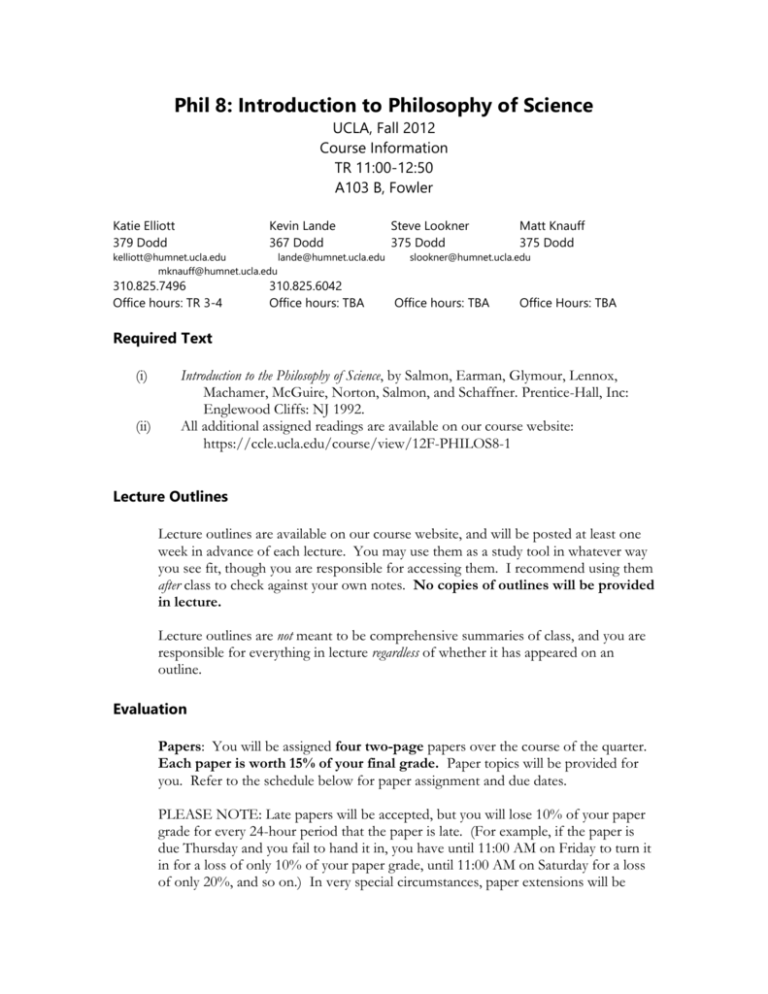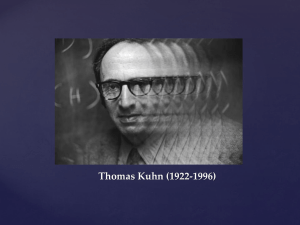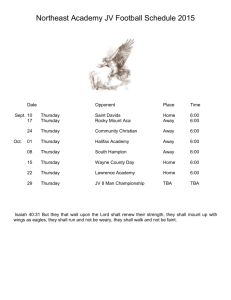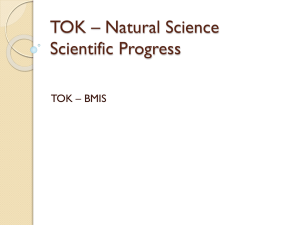Phil 8: Introduction to Philosophy of Science - Katrina Elliott
advertisement

Phil 8: Introduction to Philosophy of Science UCLA, Fall 2012 Course Information TR 11:00-12:50 A103 B, Fowler Katie Elliott 379 Dodd Kevin Lande 367 Dodd kelliott@humnet.ucla.edu lande@humnet.ucla.edu mknauff@humnet.ucla.edu 310.825.7496 Office hours: TR 3-4 310.825.6042 Office hours: TBA Steve Lookner 375 Dodd Matt Knauff 375 Dodd slookner@humnet.ucla.edu Office hours: TBA Office Hours: TBA Required Text (i) (ii) Introduction to the Philosophy of Science, by Salmon, Earman, Glymour, Lennox, Machamer, McGuire, Norton, Salmon, and Schaffner. Prentice-Hall, Inc: Englewood Cliffs: NJ 1992. All additional assigned readings are available on our course website: https://ccle.ucla.edu/course/view/12F-PHILOS8-1 Lecture Outlines Lecture outlines are available on our course website, and will be posted at least one week in advance of each lecture. You may use them as a study tool in whatever way you see fit, though you are responsible for accessing them. I recommend using them after class to check against your own notes. No copies of outlines will be provided in lecture. Lecture outlines are not meant to be comprehensive summaries of class, and you are responsible for everything in lecture regardless of whether it has appeared on an outline. Evaluation Papers: You will be assigned four two-page papers over the course of the quarter. Each paper is worth 15% of your final grade. Paper topics will be provided for you. Refer to the schedule below for paper assignment and due dates. PLEASE NOTE: Late papers will be accepted, but you will lose 10% of your paper grade for every 24-hour period that the paper is late. (For example, if the paper is due Thursday and you fail to hand it in, you have until 11:00 AM on Friday to turn it in for a loss of only 10% of your paper grade, until 11:00 AM on Saturday for a loss of only 20%, and so on.) In very special circumstances, paper extensions will be granted, but you must notify your TA about your situation before the paper is due, as soon as it is practical to do so. Midterm: You will take an in-class midterm on Thursday, November 1st. The midterm format will be multiple choice and T/F. More information about the content of the midterm will be provided near the end of October. Your midterm is worth 15% of your final grade. Final: You will take a final exam on Thursday, December 13th from 3:00PM to 6:00PM. The final will be the same format as the midterm. More information about the content of the final will be provided in early December. Your final is worth 15% of your final grade. Attendance and Participation: Your attendance in lecture is not mandatory, though you are responsible for all information covered in lecture. Most students will find it very difficult to do well in this course without regularly attending lecture. If you need to miss lecture, it is a good idea to arrange to borrow a fellow classmate’s notes. Neither your TA nor I will provide you with notes for lectures that you have missed. Attendance in recitation is mandatory. Your TA will take attendance. Furthermore, class discussion is an essential feature of any good philosophy class. Recitation is your opportunity to ask questions, make points, clarify issues, and complain about me. Recitation discussion will make your time in class much more fruitful and enjoyable. Accordingly, 10% of your final grade will be a function of your attendance and participation. If there is anything that your TA or I can do to make you personally feel more comfortable interacting during class, do not hesitate to let us know. Completion: Turning in each 2-page paper and taking both the midterm and the final are required for receiving a passing grade in this class. If you do not complete each of these requirements, you will fail this course even if your numerical grade is above failing. Remember that it is your responsibility to contact your TA or me about any missing work. Conduct Code: In accord with the UCLA Student Conduct Code (available in full at http://www.deanofstudents.ucla.edu/Code_choice.php), take care to submit only work that is your own. Undergraduate Writing Center The Undergraduate Writing Center offers UCLA undergraduates one-on-one sessions on their writing. The Center is staffed by peer learning facilitators (PLFs), undergraduates who are trained to help at any stage in the writing process and with writing assignments from across the curriculum. Our Services Scheduled appointments 50-minute appointments in A61 Humanities 30-minute appointments in Reiber 115 (for dorm residents only) work in person with a Peer Learning Facilitator (PLF) Walk-in appointments walk-in appointments available in A61 Humanities & Reiber 115 first-come, first-served Online Writing Center (OWC): 50-minute appointments submit your paper online, using Google Docs discuss your paper with a Peer Learning Facilitator, using Google Voice Chat What you should bring to the Writing Center: A draft if you have one Preliminary notes or writing if you don’t have a draft A copy of the assignment Instructor or peer comments on your paper Copies of readings or research related to the assignment. Locations A61 Humanities; Mon. – Thurs. 10AM – 6PM; Fri. 10AM – 3PM Reiber 115; Sun. – Thurs., 7 – 9 PM (for dorm residents only) . Appointments Students can walk-in but appointments are preferred. Visit our website: www.wp.ucla.edu. Click on “UCLA Writing Center/Make an Appointment.” Contact 310-206-1320; wcenter@ucla.edu Reading Schedule Most days have been divided into two halves (“A” and “B”), each associated with a different topic, outline handout, and assigned reading. Be advised: you are responsible for both the A and B reading for each day. Also, while I will do my best to keep us on the following reading schedule, it is subject to change (with the following exceptions: paper assignment due dates will never be earlier than the schedule indicates, paper assignments will always be given on the day that the schedule indicates, and the midterm and final dates will not change.) At the end of each lecture, I’ll announce the topic/outline/reading for next lecture. All readings are either from your book, or are available on our class website. Scientific Explanation Thursday, September 27: A. Course Introduction i. Syllabus ii. Schedule B. Introduction to Scientific Explanation ii. Outline 1: Introduction to Scientific Explanation ii. Reading: First book chapter up to and including 1.7. Tuesday, October 2nd: A. D-N model i. Outline 2: The Deductive-Nomological Model ii. Reading: Book Chapter 1, 1.8, 1.10 B. I-S model i. Outline 3: The Inductive-Statistical Model ii. Reading: Book Chapter 1, 1.11-1.13 Thursday, October 4th: A. S-R model i. Outline 4: The Statistical-Relevance Model ii. Reading: Book Chapter 1, 1.14 B. Introduction to Laws of Nature i. Outline 5: Introduction to Laws of Nature ii. Reading: Book Chapter 1, 1.9 Tuesday, October 9th: A. Dretske on Laws of Nature i. Outline 6: Dretske ii. Reading: “Laws of Nature”, Fred I. Dretske, Philosophy of Science , Vol. 44, No. 2 (Jun., 1977), pp. 248-268 (Available Electronically) B. Dretske Continued Thursday, October 11th: A. Pragmatics of Explanation i. Outline 7: Pragmatics of Explanation ii. Reading: Book Chapter 1, 1.15- End of Chapter B. Conclusion of Unit i. Paper Assignment #1 (Available Electronically). Due October 23rd. Confirmation and the Scientific Method Tuesday, October 16th: A. Introduction to Justification i. Outline 8: Knowledge and Justification B. Problem of Induction i. Outline 9: The Problem of Induction ii. Reading: “An Encounter with David Hume” (Available Electronically) (Wesley Salmon, from Joel Feinberg, Reason and Responsibility, pp. 190-208) Thursday, October 18th: A. New Riddle of Induction i. Outline 10: New Riddle of Induction ii. Reading: “The New Riddle of Induction” (Available Electronically) (Nelson Goodman, excerpt from Fact, Fiction, and Forecast. Cambridge, MA: Harvard University Press, 1983) B. Pragmatic Vindication i. Outline 11: The Pragmatic Vindication of Induction ii. Reading: Book Chapter 2, 2.6.5 (pg. 64-65) Tuesday, October 23rd: A. H-D Method i. Outline 12: The Hypothetico-Deductive Method ii. Reading: Book Chapter 2, 2.2 B. Problems with the H-D Method i. ii. iii. Outline 13: Problems with the H-D Method Reading: Book Chapter 2.3 Reading: “Physical Theory and Experiment” (Available Electronically) (excerpt from Pierre Duhem, The Aim and Structure of Physical Theory, trans. Philip P. Wiener (Princeton, N.J.: Princeton University Press, 1954) Thursday, October 25th: A. Qualitative Confirmation i. Outline 14: Qualitative Confirmation ii. Reading: “Confirmation” (Available Electronically) (excerpt from Alan Hájek and James M. Joyce. “Confirmation” in The Routledge Companion to Philosophy of Science ed. Stathis Pziollos and Martin Curd. Routledge: New York, NY 2008) B. The Paradox of the Ravens i. Outline 15: The Paradox of the Ravens ii. Reading: “The Raven Paradox” (Available Electronically) (excerpt from Martin Curd and J.A. Cover. Philosophy of Science: The Central Issues. W.W. Norton & Company: New York, NY 1998. pp. 659-663) Tuesday, October 30th: A. Deductivism i. Outline 16: Deductivism ii. Reading: Book Chapter 2, 2.6.4 (pg. 63-64) B. Conclusion of Unit i. Paper Assignment #2. Available Online. Due November 8h. Thursday, November 1st: A. In-Class, Multiple Choice Midterm Realism, Anti-Realism, and Relativism Tuesday, November 6th: A. Introduction to the Case for realism i. Outline 17: Realism and Anti-Realism ii. Reading: “Realism/Anti-Realism” (Available Electronically) (Michael Devitt. “Realism/Anti-Realism” in The Routledge Companion to Philosophy of Science ed. Stathis Pziollos and Martin Curd. Routledge: New York, NY 2008) B. Introduction to the case against realism (Same outline and reading) Thursday, November 8th: A. The Structure of Scientific Revolutions i. Outline 18: Kuhn 1 ii. Reading: Kuhn 1, excerpt from The Structure of Scientific Revolutions (Available Electronically) (Thomas Kuhn. The Structure of Scientific Revolutions. University of Chicago Press: Chicago, IL 1962, ’70, ’96.) Tuesday, November 13th: A. The Structure of Scientific Revolutions i. Outline 19: Kuhn 2 ii. Reading: Kuhn 2, excerpt from The Structure of Scientific Revolutions (Available Electronically) (Thomas Kuhn. The Structure of Scientific Revolutions. University of Chicago Press: Chicago, IL 1962, ’70, ’96.) Thursday, November 15th: A. The Structure of Scientific Revolutions i. Outline 20: Kuhn 3 ii. Reading: Kuhn 3, excerpt from The Structure of Scientific Revolutions, (Available Electronically) (Thomas Kuhn. The Structure of Scientific Revolutions. University of Chicago Press: Chicago, IL 1962, ’70, ’96.) Tuesday, November 20th: A. A Final Look at Relativism i. Outline 21: Relativism Wrapped ii. Reading: “Relativism about science” (Available Electronically) (Maria Baghramian. “Relativism about science” from The Routledge Companion to Philosophy of Science ed. Stathis Pziollos and Martin Curd. Routledge: New York, NY 2008) B. Conclusion of Unit i. Paper Assignment #3. Available Online. Due November 29th. Thursday, November 22nd: THANKSGIVING BREAK Demarcation, Creationism, and Evolutionary Theory Tuesday, November 27th: A. Falsificationism i. Outline 22: Falsificationism ii. Reading: “Critical Rationalism and Science” (Available Electronically) (excerpt from Gurol Irzik. “Critical Rationalism”. from The Routledge Companion to Philosophy of Science ed. Stathis Pziollos and Martin Curd. Routledge: New York, NY 2008) B. Criticisms i. Outline 23: Criticism of Falsificationism ii. Reading: “Logic of Discovery” (Available Electronically) (Thomas Kuhn. excerpt from “Logic of Discovery or Psychology of Research?”, in Criticism and the Growth of Knowledge, edited by I. Lakatos and A. Musgrave, London: Cambridge University Press: 1–23) Thursday, November 29th: A. Creationism and Demarcation i. Outline 24: Creationism and Demarcation ii. Reading: Ruse Witness Testimony Sheet. (Available Electronically) (Full Testimony available here: http://www.antievolution.org/projects/mclean/new_site/pf_trans/mva_tt_ p_ruse.html) B. Criticism i. Outline 25: Criticism ii. Reading: “Science at the Bar” (Larry Laudan.) Tuesday, December 4th: A. Evolutionary Theory and Demarcation i. Outline 26: Evolutionary Theory and Demarcation ii. Reading: “Believing Where We Cannot Prove” and “Darwin Redux” (Available Electronically) (Philip Kitcher. Excerpt from Abusing Science: The Case Against Creationism. MIT Press: Cambridge, MA 1984 pp 30-63) B. Conclusion of Unit i. Paper Assignment #4. Available Online. Due Thursday, December 13th. Thursday, December 6th: A. Last-day-of-class-type activities, including final review. Thursday, December 13th: A. Final Examination. 3:00PM- 6:00PM






